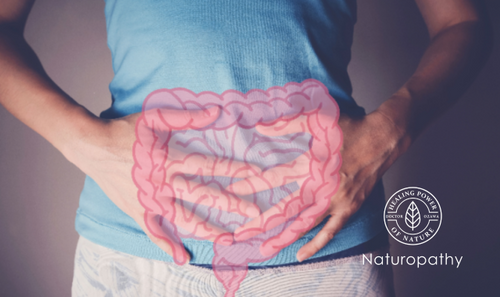Toxins pour out from the gut/ Dysbiosis
Toxins pour out from the gut/ Dysbiosis
The intestinal microflora, or gut flora, and its various effects on human health are often discussed on the Internet, television, and magazines. The intestinal tract is home to a large number of very diverse bacteria. There are 100-1,000 trillion individuals inhabiting hundreds to about 1,000 different types of bacteria. As we often hear the terms "good bacteria" and "bad bacteria," some good bacteria are beneficial to us, synthesizing vitamins and producing nutrients and harmful bacteria that create infections, carcinogens, and toxins. It is known that there are individual differences in intestinal bacteria, but people who live in rich natural environments have richer intestinal bacteria than those who live in urban areas. The types of intestinal bacteria change with age from childhood, adolescence, and old age. Since putrefactive intestinal bacteria increase with age, it can be said that maintaining healthy intestinal bacteria is a way to prevent aging.
Mutual dependence between humans and intestinal flora

Just as human activity affects the earth's natural environment, the intestinal bacteria in our gastrointestinal tract also affect our health. And conversely, just as the earth's environmental challenges affect human activities, our human health also influences the bacteria in our intestines.
The function of beneficial bacteria
Normal intestinal flora performs essential functions such as the production of nutrients in the colon called short-chain fatty acids from dietary fiber, the production of vitamin K, biotin, and folic acid, and the detoxification of carcinogens and foreign substances entering the body from food and other sources, metabolizing and expelling cholesterol, and inhibiting the growth of malignant bacteria.
Intestinal flora and immune system
The bacteria greatly influence the development of the immune system in the gut. Seventy percent of our immune cells are concentrated in the gut. Gut bacteria communicate with our immune cells, sometimes stimulating the immune system to boost immunity and sometimes signaling it to reduce excessive immune responses such as allergies and inflammation.
What is dysbiosis?

Dysbiosis is a condition in which the intestinal flora is out of balance. For example, beneficial intestinal bacteria prevent the abnormal growth of Clostridioides difficile, a representative of harmful bacteria, in the intestines. However, when the intestinal flora is out of balance due to antibiotics, Clostridioides difficile grows and causes abdominal pain, diarrhea with bleeding, and pseudomembranous enteritis.
Symptoms of dysbiosis
Symptoms of dysbiosis are, first of all, gastrointestinal disturbances, which include the following :
- Bloating
- Gas
- Diarrhea
- Constipation
- Heartburn or acid reflux

Damage to the intestinal wall can lead to food sensitivities and allergies. Harmful bacteria can also cause bad breath and unpleasant body odor by causing putrefaction. The intestinal lining is damaged, and nutrient absorption is reduced, leading to weight loss and chronic fatigue. Toxins produced by bad bacteria can cause various effects on the body, including poor physical condition, a poor immune system, and skin disorders—acne, rosacea, eczema, rashes, joint pain, etc.
Moreover, bacterial toxins can also affect the nervous system and mental health, resulting in:
- Lack of concentration
- Headaches
- Depression
- Anxiety
Symptoms such as the above may also appear.
These symptoms can be very similar to the small intestinal bacteria overgrowth (SIBO) and leaky gut, as well as their simultaneous occurrence.
Dysbiosis and Obesity

With dysbiosis, both weight gain and weight loss can occur. Although it was mentioned earlier that dysbiosis causes weight loss due to decreased absorption of nutrients, this contradictory and opposite phenomenon is caused by the different types of bacteria in the intestine. Some harmful bacteria block the absorption of nutrients, causing weight loss, while others block insulin signaling, leading to insulin resistance and fat storage. Frighteningly, some bacteria are known to exist that even affect the secretion of hormones that stimulate hunger and suppress appetite. With dysbiosis, a change in the balance of these hormones can affect appetite and sense of fullness. In addition, certain intestinal bacteria may enhance fat accumulation in the body. Furthermore, imbalances in gut bacteria tend to increase cravings for unhealthy foods, especially sugars and fats, and increase calorie consumption. Increased cravings for sugar are a common symptom when there is an overgrowth of yeasts, such as Candida, that feed on sugar.
Diseases that have been linked to dysbiosis
Disruption of the intestinal flora balance is believed to cause not only gastrointestinal discomfort but also obesity, high blood sugar, decreased insulin sensitivity, worsening inflammation in the body, and increased risk of cancer.
Dysbiosis and Colorectal Cancer

The liver produces bile, essential for absorbing oils and fats, and it is secreted through the gall bladder to the intestines. In dysbiosis, this bile is metabolized by harmful bacteria and converted to secondary bile acids. This secondary bile acids are known to increase the risk of colorectal cancer. Studies have also shown that secondary bile acids are highly toxic to the liver and can affect blood sugar and lipid metabolism.
Dysbiosis and Autism Spectrum Disorders
Since a higher-than-normal number of mold-derived metabolites have been found in autism spectrum disorders, it is assumed that the intestinal flora is disrupted and the intestinal environment is prone to the growth of Candida and other molds.
Dysbiosis and Autoimmune Diseases
Since intestinal bacteria and the immune system are closely related, autoimmune diseases such as Rheumatoid arthritis are connected with the intestinal environment and intestinal flora.
Causes of dysbiosis
Causes of dysbiosis include antibiotics, Western diets (high fat, high sugar, high protein, low fiber), low stomach acidity, decreased digestive enzymes, food poisoning, low immune function, and stress. Let us explain the reasons for this.
Antibiotic

Antibiotics significantly disrupt the balance of intestinal flora and cause abnormal growth of Clostridioides difficile (mentioned above) and candida (yeast), so the use of non-essential antibiotics should be limited.
Poorly balanced diet
Western diets decrease short-chain fatty acids and increase the oxygen concentration in the intestines, resulting in a decrease in the number of obligate anaerobic bacteria, which cannot live in the presence of oxygen, and an increase in the number of facultative anaerobic bacteria, which can live with or without oxygen.
Indigestion
A decrease in stomach acid, digestive enzymes, and food poisoning can cause the intestine to attract bacteria other than those that are indigenous to the intestine.
Stress

Stress increases the secretion of the stress hormone cortisol. When cortisol rises, the intestinal tract is more susceptible to damage, and the immune system is weakened. The intestinal mucosa secretes mucus to provide a barrier to prevent harmful bacteria from coming into direct contact with intestinal tract cells. Still, increased stress causes a decrease in mucus secreted by the intestinal mucosa, making it easier for harmful bacteria to attach to and multiply in the intestinal tract cells.
Artificial sweeteners
It has been confirmed that continuous use of artificial sweeteners significantly reduces the number of good bacteria, such as Bifidobacterium bifidum and Lactobacillus acidophilus.
* These statements have not been evaluated by the Food and Drug Administration. This product is not intended to diagnose, treat, cure, or prevent any disease.

 US Dollar
US Dollar

